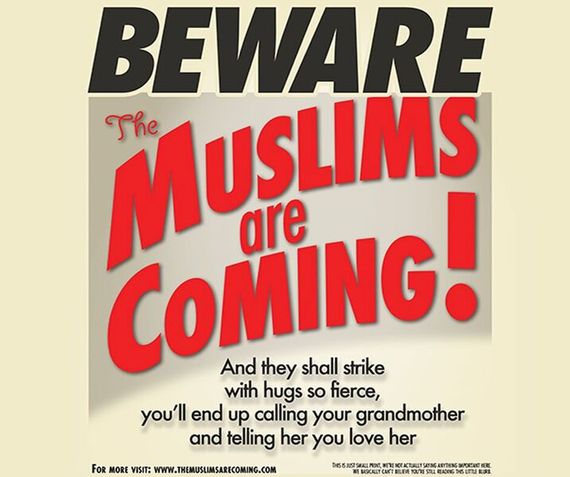It is becoming increasingly common in anti-Muslim rhetoric to claim Islam as a political ideology, instead of a Muslim faith. The increase in suspicion and fear towards Muslims fuels this idea as people begin to immediately associate Islam with violence.
As a religion based on justice and peace, Islam is a guide of living by creating respect and kindness to ourselves and others. Therefore, it is irrevocably offensive to accuse Islam of prescribing to political beliefs and systems that are implicitly harmful.
The first step to understanding the complex and multidimensional religion is by making sense of the context of Islamophobia. Embedding terrorism in the Islamic faith is very detrimental. This false use of rhetoric has serious repercussions for Muslim Americans -- one consequence resulting in the overwhelming rise of intolerance towards those of the Muslim faith.
Reducing the Islamic faith to a political ideology betrays the spiritual teachings and practices in Islam that promote knowledge and open-heartedness. Shortly put, it is not Islam that is the problem, but the lack of awareness of how the religion functions, that is.
It's deeply upsetting seeing a religion that has historically made significant contributions towards progress and civilization being equated to the acts of ISIS and other violent extremists.
If we think broadly about the trueness of our American values, free expression and open-mindedness has its limits, especially for Muslim Americans.
Though many people have a taste for satire such as the Onion and the Daily Show, some perceive critical satire on Islamophobia as a political statement. Nonetheless, Muslim Americans are unable to freely express their faith without experiencing fear and hatred towards them.
With the mission to expand the minds of regular Americans, comedians Dean Obeidallah and Negin Farsad co-directed the 2013 documentary The Muslims Are Coming!, which focuses on Islamophobia through the medium of comedic prose. The documentary features interviews with citizens, celebrities, and religious leaders in various areas around the nation. Comedy icons like Jon Stewart and Janeane Garofalo also give social commentary on the power of comedy as well as the prominence of bigotry in America. With the intention to bring awareness on a wide range of perspectives on Islam, Obeidallah and Farsad decided to advertise their documentary with subway posters in New York City.
The comedy duo believes that humor is an underrated yet effective mechanism to dispel common myths about Muslims; a light-hearted, but inspiring way to shed awareness on the persistence of problematic Islamophobic remarks being made by public figures, including Bill O'Reilly, Donald Trump and others. Is is for precisely this reason that the comedians decided to start their ad campaign in the densely-populated and diverse New York City.
Ironically enough, they would find their advertising to be a 'violation' of the New York Metropolitan Transit Authority's (MTA) rules. MTA accused Farsad and Obeidallah of disputed "political speech". They never expected that subway commuters would have to wait five months to laugh at some of their jokes.
The banning of these posters speaks volumes as to how anti-Muslim ideology has permeated into every facet of American society. Muslim Americans are continuously put in a position of social isolation and marginalization. The censorship of these posters only hinders the opportunity for open discourse to understanding the underlying causes of violence and internalized fear towards Muslims.
In response to the ban, the comedians filed a federal lawsuit in June 2015, with the argument that it was a violation of their First and Fourteenth Amendments. Recently, the court ruled that their advertisements actually did not amount to political speech. Farsad and Obeidallah were thrilled to be able to shed a critical light on how Americans wrongly perceive Muslims, while simultaneously posing as vocal representatives of the Muslim faith.
Although disarming, the ads are lighthearted and witty in a way that upholds the project's goal of sharing humor and stories about the average American Muslim experience; combatting prejudice and bigotry in both casual and explicit instances. As the satirical ads begin to appear in all 144 subway stations, Farsad and Obeidallah hope that they will serve as a wake-up call to the preposterous nature of Islamophobia.
The comedians are adamantly showing how crucial it is for people to respond effectively to anti-Muslim rhetoric in order to stop the vilification of Islam. Americans need to start asking more questions, while back-pocketing their assumptions. The easiest mode of doing this is through direct interaction with Muslims who practice their faith. Understanding that Islam is not a radical political ideology can start with a small anti-Islamophobic joke on a subway poster. And the open discourse it prompts will only carry the discussion further.
It's time for Americans to provide space for Muslim Americans of all professions and experiences to express themselves. In doing so, we can better educate ourselves on what "Islam" really means. It is with great importance that we strive for a society that acknowledges that violence is not motivated by Muslim values, but instead by greed and power.
What matters right now is dissecting the true American Muslim narrative beyond the violence wrongly instigated by 'Muslims' who fail to practice the true form of the Islamic faith.
And thus, we can flourish together in the true spirit of Islam:
"Behold, We have created you all...and have made you into tribes and families so that you may know one another (and so build mutuality and co-operative relationships, not so that you may take pride in your differences of race or social rank, and breed enmities)." [Qur'an 49:13]
Also on HuffPost:
